Search results for "www.booksfromfinland.fi/2014/05/another-morning-another-day"
A day in the life
30 September 1996 | Archives online, Fiction, Prose
Extracts from the novel Drakarna över Helsingfors (‘Kites over Helsingfors’, Söderströms, 1996). Introduction by Jyrki Kiiskinen
It is December 1970, it is Friday afternoon and Helsingfors is shrouded in a damp, leaden-grey fog when Jacke Pettersson, trainee electrician at Mid-Nyland Vocational College, signs a receipt for his driving licence at Vallgård Police Station.
At home in the flat in Svenska Gården in Munkshöjden: the very next evening Jacke sneaks his hand down into his father’s, typesetter K-G. Pettersson’s, overcoat pocket. It is getting on for 9 o’clock and KG is sitting deeply submerged in his favourite armchair, staring concentratedly at the premiere of a new show.
Six out of forty
make it every week
sings a bright girl’s voice.
Then: the Official Supervisors and their solemn ‘Good evening’. And then: the blonde girl in her mini-dress and high boots, the glass holder with its plastic balls, the plastic balls with numbers on. More…
The private I? Me and my home
17 June 2014 | Reviews
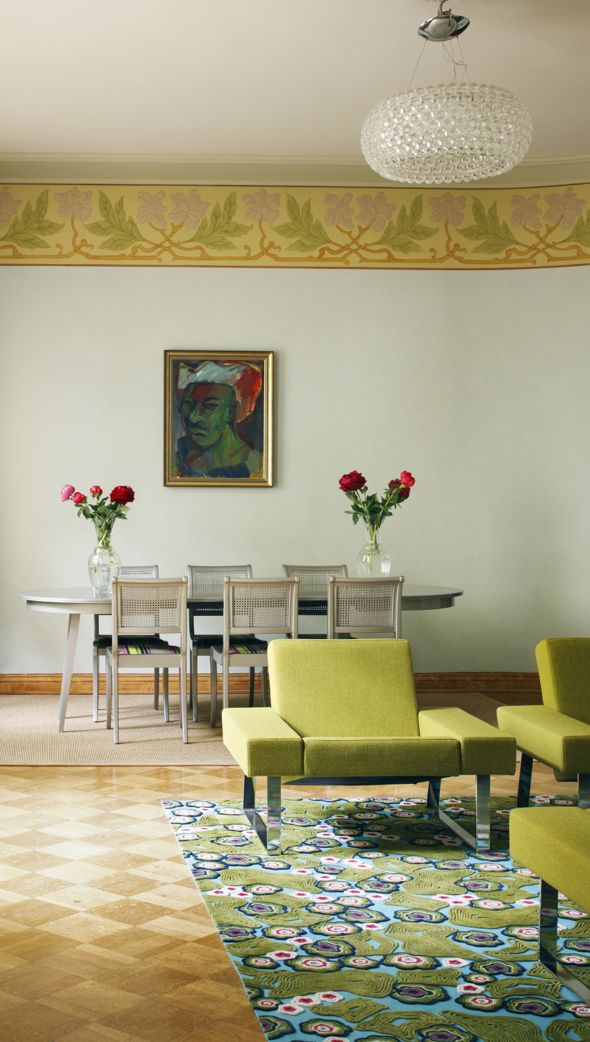
Art Nouveau with a modern twist. Photo: Avaimia ajattomiin suomalaisiin sisustuksiin / Jaanis Kerkis
Avaimia ajattomiin suomalaisiin sisustuksiin
[Keys to timeless Finnish interiors]
Design: Hanni Koroma, text: Sami Sykkö, photographs: Jaanis Kerkis
Helsinki: Gummerus, 2014. 123 pp., ill.
ISBN 978-951-20-9507-0
€32.90, hardback
Katja Lindroos
MOMO. Koti elementissään
[MOMO. The home in its element]
Photography: Riikka Kantinkoski, Niclas Warius
Helsinki: Siltala, 2013. 154 pp., ill.
ISBN 978-952-234-164-8
€32.90, hardback
www.momokoti.fi (in Finnish only)
‘Interior decoration’ has become an extremely popular pastime in Finland – as elsewhere where the standard of living allows it.
Innumerable magazines and blogs keep churning out photos of rooms with large white, cushioned sofas, glossy white kitchen cabinets and white floors on which furniture seems to float forlornly. Walls are decorated with wooden or metallic letters forming words: love; home, sweet home. In the kitchen the bread bin bears the word BREAD. (Bookcases, with actual books, are rare.)
Why is it that in our age which worships ‘individuality’, trends rule? More…
The miracle of the rose
30 June 1997 | Archives online, Fiction, Prose
Extracts from the novel Naurava neitsyt (‘The laughing virgin’, WSOY, 1996). The narrator in this first novel by Irja Rane is an elderly headmaster and clergyman in 1930s Germany. In his letters to his son, Mr Klein contemplates the present state of the world, hardly recovered from the previous war, his own incapacity for true intimacy – and tells his son the story of the laughing virgin, a legend he saw come alive. Naurava neitsyt won the Finlandia Prize for Fiction in 1996
28 August
My dear boy,
I received your letter yesterday at dinner. Let me just say that I was delighted to see it! For as I went to table I was not in the conciliatory frame of mind that is suitable in sitting down to enjoy the gifts of God. I was still fretting when Mademoiselle put her head through the serving hatch and said:
‘There is a letter for you, sir.’
‘Have I not said that I must not be disturbed,’ I growled. I was surprised myself at the abruptness of my voice.
‘By your leave, it is from Berlin,’ said Mademoiselle. ‘Perhaps it is from the young gentleman.’
‘Bring it here,’ I said. More…
The engineer’s story
30 June 1981 | Archives online, Fiction, Prose
A short story from Maailman kivisin paikka (‘The stoniest place in the world’, 1980). Introduction by Pekka Tarkka
Coffee was going to be served down by the river. The engineer took my elbow and led me across his paved courtyard and over his lawn; we settled ourselves down in cane chairs under the trees. Mirja came out of the house with a tray of coffee and coffee-cups, a loaf of sweet bread, already cut, some marble cake and some biscuits. The engineer said nothing. My eye wandered over the ample weeping birches by the river, the mist creeping up in the cool of the evening and shifting in the cross-pull of the breeze and the current, and I watched Mirja moving under the trees back to the house and then down again to the riverbank.
As we sipped our coffee we spoke about chance, and the part it plays in life, about my husband – for I was able to speak about him now: enough time had gone by. The engineer eased himself into a comfortable position, gave me a quick look and then launched off into an account of his own, about his trip abroad:
I spotted the news item as I was going through the morning paper on the plane. I sat more or less speechless all of the first leg, listening to Kirsti and her husband confabulating. I didn’t say anything during the stop-over in Copenhagen, either, where they wanted to get some schnapps and, of course, some chocolate ‘if Kirsti would really like some’. We came rushing back into the plane just as the last English, German and Danish announcements were coming over, and then we sat waiting for the take-off. That was delayed too because of a check-up (not announced), and then we were off again for Zurich, me without a word and they whispering together. Then it was the bus as far as the terminal, and after that a taxi to the hotel. Quite clearly Kirsti hadn’t heard a thing about it yet, and probably hadn’t had much contact with Erkki for quite some time, her new husband even less. More…
All aboard
30 December 2005 | Fiction, Prose
Extracts from the novel Nooakan parkki (‘Noahannah’s barque’, Tammi, 2005)
A Royal Navy Three-funnel Brig
The crew:
Matilda, an overeating cat
Five geese
20 hens
A fat narcoleptic cock
A couple of ducks
A goat
Three dogs
48 bats
Six woodpeckers
104 titmice
There’s a north-westerly blowing.
Djibouti 253
Three feet long from the east and five from the west, plus two hat-heights above the earth’s surface; standing on the sauna bench I scan the horizon for any omens – a raven, a woodpecker or a flock of waxwings. A crow would do. More…
Another morning, another day
Poems from Unen kaivo (‘The well of dreams’, WSOY, 1936). Introduction by Satu Grünthal
IN THE MIRROR
Strange and truly wondrous
in the mirror you look at me.
All I really know is
that you I cannot be.
With my eyes you survey me,
with my lips you smile, too,
what I see in the mirror
is not me, but you, just you.
Whoever you are – astral morning,
eternal night – in the frame
like a wraith, a ghostly phantom,
invisible I remain. More…
Stories in the stone
2 December 2010 | Extracts, Non-fiction
Extracts from Jägarens leende. Resor in hällkonstens rymd (‘Smile of the hunter. Travels in the space of rock art’, Söderströms, 2010)
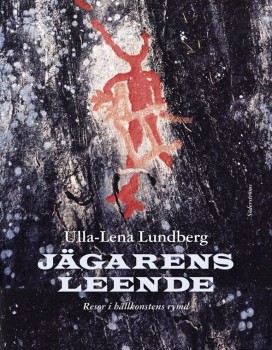 ‘Why do some people choose to expend what is often a great deal of effort hammering images in the bedrock itself, while others conjure up, in the blink of an eye, brilliantly radiant pictures on a rock-face that was empty yesterday but is now peopled by mythological animals, spirits and shamans?
‘Why do some people choose to expend what is often a great deal of effort hammering images in the bedrock itself, while others conjure up, in the blink of an eye, brilliantly radiant pictures on a rock-face that was empty yesterday but is now peopled by mythological animals, spirits and shamans?
‘I think about this often – I who love painting but who still chose a career that involves me sitting and hammering away, day in and day out, like a true rock-carver,’ writes author and ethnologist Ulla-Lena Lundberg in her new book on the art of the primeval man
When the children of Israel went into Babylonian captivity, hanging up their harps on the willow-trees and weeping as they remembered Zion, my sister and I were already sitting by the rivers of Babylon. We knew how they felt. Our father was dead and we had been sent away from our home. We sat there clinging to each other, or rather I was the one clinging to Gunilla, and she had to try to rouse herself and find something for us to do, to give us something else to think about. More…
Maria Turtschaninoff: Maresi. Krönikor från röda klostret [Maresi. Chronicles of the red convent]
6 March 2015 | Mini reviews, Reviews
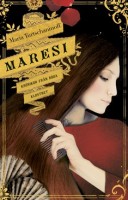 Maresi. Krönikor från röda klostret
Maresi. Krönikor från röda klostret
[Maresi. Chronicles of the red convent]
Helsinki: Schildts & Söderströms, 2014. 213 pp.
ISBN 978-951-52-3471-1
€18.90, hardback
Maresi. Punaisen luostarin kronikoita
Suom. [Translated from Swedish into Finnish by]: Marja Kyrö
Helsinki: Tammi, 2014. 213 pp.
ISBN 978-951-31-8000-3
€25.90, hardback
Maria Turtschaninoff (born 1971) has quickly established a place as a leading author of Finland-Swedish young adults’ literature. Her fantasy novel Maresi is set in an old convent run entirely by women. The narrator Maresi is a conscientious girl loved by the congregation of sisters; she is gradually learning of her own special talents and what is expected from her. The peace of the convent is threatened with the arrival of the mute, uncommunicative Jai. Her experience of trauma gradually come to light and the girls work up their collective courage, together with the other women, to challenge the despotism of men. Turtschaninoff is a visual storyteller; her descriptions of nature, convent life, and animal care are indelible. The setting is vividly drawn and the sheltered environment feels well depicted. The novel unflinchingly takes on women’s experiences of physical and psychological violence, and its points of identification transcend all cultural boundaries. This provocative, feminist novel won the 2014 Finlandia Junior prize.
Translated by Lola Rogers
A slow passion
30 September 2007 | Fiction, Prose
A short story from the collection of short stories Hidas intohimo (‘A slow passion’, Gummerus, 2007)
I don’t want to interfere with it. If something comes of it, then something comes of it. You can’t interfere with time, or fate, or another person. Time ripens things on its own. Fate takes a longer view of things than people do. Like the prophet says, there is a time for every purpose, for my purposes and other people’s.
This garden cottage is a good place to watch everything quietly, a ringside seat for someone who doesn’t want to flail around getting smashed up. The potatoes bloom when it’s time for them to bloom, depending on the length of the summer, the weather, and the time they were planted. Their white and purple flowers are worthy of admiration– potato flowers are flowers, after all. But when the flowers are just opening, it’s not yet time to go digging around among the roots. You have to restrain yourself and wait until the tubers form. You have to wait until they’re finished blooming and the flowers are replaced by plumping green, poisonous berries – though not all potato varieties produce them. But if your fingers are really itching for them, you can poke into the dirt and grope around a little before it’s really time, feel for tubers and remove them carefully, patiently, leaving the plant undisturbed for the smaller ones to grow. If the groping turns up something, you can slip away and savour it, but you still have to wait before you can dig up the whole plant with its rootstock, its beautiful pure tubers heaved up onto the soil, as if Life were offering itself on a silver salver. Then you can have them. They’re ready. But it takes time. Many good things are destroyed by impatience. More…
About calendars and other documents
30 June 1982 | Archives online, Fiction, Prose
An extract from Sudenkorento (‘The dragonfly’, 1970). Introduction by Aarne Kinnunen
I now have. Right here in front of me. To be interviewed. Insulin artist. Caleb Buttocks. I have heard. About his decision. To grasp his nearly. Nonexistent hair and. Lift. Himself and. At the same time. His horse. Out of the swamp into which. He. Claims. He has sunk so deep that. Only. His nose is showing. How is it now, toe dancer Caleb Buttocks. Are you. Perhaps. Or is It your intention. To explain. The self in the world or. The world. In the self. Or is It now that. Just when you. Finally have agreed to. Be interviewed by yourself. You have decided. To go. To the bar for a beer?
– Yes. Can you spare a ten?
– Yes.
– Thanks. See, what’s really happened is that. My hands have started shaking. But when I down two or three bottles of beer, that corpse-washing water as I’ve heard them call it, my hands stop shaking and I don’t make so many typing errors. If I put away six or seven they stop shaking even more and the typing mistakes turn really strange. They become like dreams: all of a sudden you notice you’ve struck it just right. Let’s say, ‘arty’ becomes ‘farty’. Or I mean to say, ‘it strikes me to the core’ I end up typing ‘score’. It’s like that. A friend of mine, an artist, once stuck a revolver in my hand. Imagine, a revolver! I’ve never shot anything with any kind of weapon except a puppy once with a miniature rifle. My God, how nicely it wagged its tail when I aimed at it, but what I’m talking about are handguns, those shiny black steelblue clumps people worship as heaven knows what symbols. It’s not as if I haven’t been hoping to all my life. And now, finally, after I’d waited over fifty years, it turned out that the revolver was a star Nagant, just the kind I’d always dreamed of. So if I ever got one of those, oh, then would sleep through the lulls between shots with that black steel clump ready under my pillow. Well, my friend the artist set out one vodka bottle with a white label and three brown beer bottles with gold labels on the edge of a potato pit – we had just emptied all of them together – stuck the fully loaded star Nagant into my hand, took me thirty yards away and said:
– Oh, Lord. More…
One hell of a time
31 December 1997 | Archives online, Fiction, Prose
Extracts from Lanthandlerskans son (‘Country shopkeeper’s son’, Söderströms, 1997). Brooklyn Bridge, Christmas Eve: Otto, a Finland-Swede, attempts to start a new life in 1930s America, where swindlers and even gangsters can, he finds, be duped – even Al Capone. Otto’s grandson listens to his story on tape
I have always loved that sight. A city that you see from the air at night, all lit up. It’s’ beautiful – and at the same time so frightening. I don’t really know how to describe it.
Well, it was Christmas Eve. I was wandering around New York. I had eaten at an automat. Do you know what that is? They don’t exist any more, but in the Twenties and Thirties they were common in America. It’s a cafe, but they didn’t have any staff or waiters, instead the walls were full of little glass boxes where the food was on display. You could select what you wanted – sandwiches and pies and salads, anything. Then you put your nickels and dimes in a slot beside the box and the glass opened and’all you had to do was take out the plate. I was fond of the automats. I liked just sitting there and watching other people eat, no one bothered about you, you were left alone and that suited me. When I’d finished eating I went outside again and somehow or other I wandered upon to Brooklyn Bridge. There was a lot of traffic, people were on their way home. Well, just as I was walking there alone in the company of my thoughts I heard someone shouting ‘Help! Help me!’ More…
Blowing in the wind
26 November 2010 | Reviews
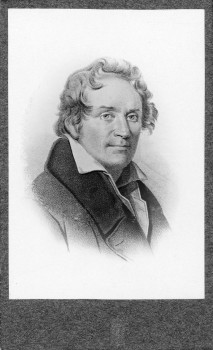
Clarinettist who travelled: Bernhard Crusell
Bernhard Crusell: Keski-Euroopan matkapäiväkirjat 1803–1822
[Bernhard Crusell: Travel Diaries from Central Europe, 1803–1822]
Suom. ja toim. [Translated into Finnish and edited by] Janne Koskinen
Helsinki: Suomalaisen kirjallisuuden seura [Finnish Literature Society], 271 p., ill.
ISBN 978-952-222-090-5
€28, hardback
Born the son of a poor bookbinder on the west coast of Finland, Bernhard Crusell (1775–1838) had talents as a clarinettist and composer that brought him considerable fame, both in his native country and further afield. Hannu Marttila reads the diaries he wrote on his travels in Europe, where his meetings with the great and the good chart the emergence of the new Romantic sensibility
‘Felix is a most beautiful child, and he is also said to be very unassuming. In his compositions one immediately recognises the signs of genius and good training. He continues to study under Zelter, and, thanks to an anticipated large inheritance, he, too, may become an independent composer. People here think he may even become another Mozart.’ More…
Perfect thing
31 December 2000 | Archives online, Fiction, Prose
Extracts from the novel Ennen päivänlaskua ei voi (‘Not before sundown’, Tammi, 2000). Interview and introduction by Soila Lehtonen
A youngster is asleep on the asphalt in the backyard, near the dustbins. In the dark I can only make out a black shape among the shadows.
I creep closer and reach out my hand. The figure clearly hears me coming, weakly raises its head from the crouching position for a moment, opens its eyes, and I can finally make out what it is.
It’s the most beautiful thing I’ve ever seen.
I know straight away that I want it. More…
Animal magic
3 June 2014 | Extracts, Non-fiction
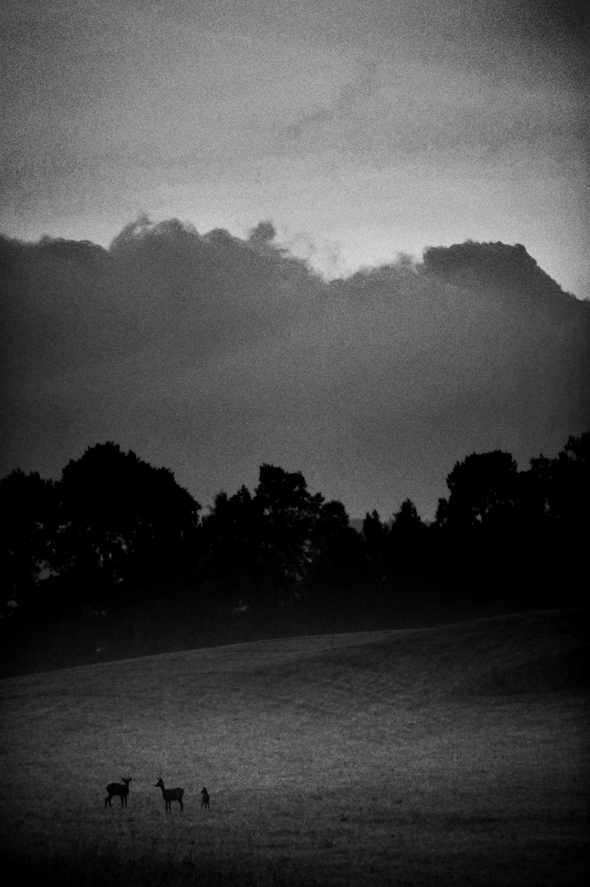
Roe deer, Sweden. Photo: Mats Andersson
A day in the life of an elk, of a lynx? Nature photographers venture into the depths of forests, in pursuit of the inhabitants – predator and prey, mythical and real. Photographs from Kohtaamisia (‘Encounters’), by Mats Andersson and Heikki Willamo, text by Willamo (Maahenki & Musta Taide [Black Art], 2014)
The feelings in our dreams. They well from depths – from those layers of awareness that the mind does not shackle. In sleep we handle and organise the events of our lives in a way which is impossible when awake, when we are conscious of ourselves and our limitations. That is why animals can come into my dreams as friends, equal partners, like me, and therefore I so often dream of having their abilities and skills.
When awake we think all the time. We think about past events and worry about the future or dream of something better. Very seldom do we live in the moment. Photographs are passing moments, often only a thousandth of a second long, but sometimes lasting minutes or even hours. In finished photographs the beholder can see much more – he adds his memories or dreams of the future. The picture-taking moment vanishes, something else comes in its stead. More…
Back in the USSR
3 October 2011 | Fiction, Prose
Extracts from Rosa Liksom’s novel Hytti nro 6 (‘Compartment no 6’, WSOY, 2011). Review by Mervi Kantokorpi
Moscow hunched itself in the dry, frosty March night, protecting itself from the touch of the icy red sun as it set. The girl entered the train’s last sleeping carriage, found her compartment, compartment number six, and breathed deeply. There were four beds in the compartment, the upper ones folded agains the wall, while between the beds was a small table, on the table a white table cloth and a plastic flower vase containing a bunch of pink paper carnations, faded by time; the shelf above the end of the bed was full of large, untidily secured parcels. The girl shoved her modest old suitcase, the one she had got from Zahar, into the metal luggage space under the hard, narrow bed; her small backpack she threw on the bed. When the station bell sounded for the first time, the girl went to stand by the corridor window. She breathed in the scent of the train, iron, coal-dust, the smells left behind by dozens of cities and thousands of people. Travellers and those who had come to see them off pushed past her, shoving her with their cases and parcels. The girl touched the cold window with her hand and looked at the platform. This train would take her through villages inhabited by deportees, through the open and closed towns of Siberia to the capital of Mongolia, Ulan Bator. More…
